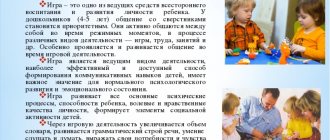Speech development in preschoolers
In order to successfully exist in society, a person needs the most important skill - the ability to communicate with other people. When communicating, a person conveys some of the information to the interlocutor using gestures and facial expressions. But the lion's share of it falls on that unique skill that is available on earth only to man. This skill is speech. Normal development of children certainly includes the acquisition of coherent speech. It is not an innate skill for people, and the child will have to master it on his own. Formed and continuously changing over many generations, speech is one of the most important components of human life. A small child faces a big, important task - to master the art of expressing his thoughts correctly and clearly, to assimilate all the richness and diversity of the Russian language. And the child, as a rule, successfully copes with its implementation.
The basics of using speech and its development occur in early childhood. That is, in the period from one year to 5-6 years, the basis is laid on which the child will subsequently build his entire life in society. Speech development is a unique phenomenon, directly related to both the intellectual development of the child and his communication skills. And, of course, during this period, a little person needs the help and support of loved ones more than ever; he needs someone who can guide his development and help him master rich and varied language material, teach him how to properly handle an amazing and complex instrument of communication - speech.
The development of coherent speech in a small person is a long and complex process. The relevance of this task for a preschool child is difficult to overestimate. With the help of speech, the child learns about the world around him, develops communication skills and associative thinking. From a scientific point of view, this process and its patterns are even studied by a separate linguistic discipline - ontolinguistics.
The child draws his first experience of reproducing human speech from his immediate environment, listening and remembering the speech of adults that he hears around him. Peculiarities of child psychology suggest imitative behavior as one of the main ones for a young child. Psychologists and sociologists have found that children who spend the first few years of life in social isolation subsequently cannot fully adapt to either language or life in society. This fact has been proven in the example of so-called wild children - children who, for some reason, were deprived of contact with people under the age of 6 years. Stories about such children repeating the fate of the hero of Kipling's fairy tale, Mowgli, periodically find documentary evidence. Only, unlike Mowgli, a child who finds himself isolated from human society at an early age cannot adapt to normal life. Such children have difficulty mastering the basics of human speech and suffer from serious developmental delays.
From this we can conclude that the early period of speech development is one of the most important in the overall development of a child, and parents should pay the closest attention to this process. Speech acquisition is a key indicator for preschool children of their overall mental development.
A child’s speech acquisition in preschool age can be divided into three stages, each of which has its own characteristics. They are closely related to both age and the general psychoneurological development of the baby.
Period up to a year
At this age, the baby is just beginning to distinguish for himself the speech of the adults around him. From the first month of life, the baby carefully peers and listens to everything that happens around him. He very quickly learns to distinguish between voices and intonations. Therefore, try to speak kindly to your baby more often, and comment out loud on your and his actions. Poems and songs are perfect for children at an early age.
If you, being next to your child, constantly contact him, talk, play, show objects and toys, then soon, already at 3-4 months, your baby will begin to engage in conversation with you, greeting you with a joyful roar.
By six months, the child gradually begins to babble, trying to pronounce syllables. At 7 months he already knows his name and turns his head when you call him by name. You can start playing “Ladushki”, “Magpie-Crow” or “The Horned Goat is Coming” with him. These nursery rhyme games will help your child better perceive rhythmically organized poetic speech, and they will simply bring a lot of joy. Try it - you'll see, the child will be delighted!
At 9-10 months, the baby can already laugh and tries to pronounce the first words, for example, “dad” or “mom”. Sing along to the music you hear. Understands the words “no”, “no”, can respond to greetings (waving a hand when saying “hello” or “bye-bye”). Your child’s vocabulary gradually begins to form, and is constantly replenished from the outside with new concepts and expressions. Poems, nursery rhymes, bedtime stories and just constant conversations with your baby will serve as an excellent incentive for him to start speaking on his own.
Initial speech acquisition
This stage of speech development occurs between the ages of approximately one and three years and has its own characteristics.
It must be borne in mind that before the child begins to master active speech and speak himself, he learns to understand the speech of others. Until about one and a half years old, only a few basic definition words can be observed in a child’s vocabulary: mom, dad, aunt, uncle, give. His family members still serve as role models for him, so don’t forget to continue telling your child what you are doing and why. He really already understands everything.
At this age, young children are prone to generalizations. Thus, "Yum!" can mean not only the feeding process, but also a child’s plate, spoon, and even a feeling of hunger. Also, in many words they discard the endings, ignore some letters (pronouncing “Aya” instead of “Anya”, etc.), and sometimes even shorten the word to one stressed syllable. There is no need to worry about these “irregularities” - they are completely normal. Over time, the child will learn to pronounce words and sounds correctly, and the family’s task is to unobtrusively explain to him how to do it correctly.
Try to articulate more clearly when talking to your baby. Give him the opportunity to watch your facial expressions when you say a new word. Show and name objects that come into your baby’s field of vision, especially while walking: a car, a dog or a crow flying past will not only entertain the child on the street, but will also help in the difficult task of developing speech.
In the second year of life, children distinguish intonation perfectly. Therefore, when reading fairy tales to your child, pay attention to the fact that a wolf or a bear, for example, speaks in a deep voice, and a little mouse squeaks in a thin voice.
After two and a half years, the child can already use simple sentences consisting of two or three words in coherent speech. In his mind, patterns begin to form in the agreement of words with each other, the difference between singular and plural. Language material acquires the features of a certain system in the child’s perception. And he begins to actively use this system, entering the next stage of speech acquisition.
Word creation
Speech development in preschool children goes through another interesting stage. At the age of about three years or a little older, the child moves from the accumulation of language material to its active development. To do this, he tries to use the patterns of language that he has managed to trace for himself at the moment. The famous children's writer Korney Ivanovich Chukovsky has a completely adult book, “From Two to Five.” Being a linguist, Korney Ivanovich in this work tried to determine what motivates small native speakers, every minute creating new words of their special children's dialect. And what did it turn out to be? It turns out that children do not create these neologisms by chance, but by sorting parts of words by meaning, and compose them following the grammatical structure of the Russian language. Thus, crackers turn into “bites” due to the semantic correspondence with the verb “bite”, a fan turns into “twirler”, a shaggy dog with long hair is succinctly characterized as “shaggy”, and the bed rest prescribed by the doctor immediately becomes “bed rest”.
Every day, every hour, a child is bombarded with many unfamiliar words, forms, and meanings. Nevertheless, he easily navigates this diversity, classifying, distributing, altering, adapting to himself the entire vocabulary available to him. A child’s speech develops easily, with a minimum of stress on the part of a small native speaker, whose intuition in relation to his native language is simply amazing!
End of preschool: preparation for reading and writing
At this stage, the child continues to acquire grammatical norms. But now he strives not so much to create as to correspond to the coherent speech of adults, to make it as correct as possible. In the monologues of a five- to six-year-old child, complex and complex constructions and linking words begin to appear. The grammatical structure of speech is leveled.
At the same age, the child begins to master written speech. And if in the first years of life, letters and numbers were an impossible abstraction for a child, but now, thanks to the experience gained, he can already trace the relationship between the real world and written language. Since reading and writing are psychophysiological processes, their relationship with the general development of speech in preschool children is very high.
As a rule, children learn to read before they write. Speech development includes the perception of the sound composition of a word on paper; understanding the relationship between sounds and letters occurs more easily if the child has sufficiently developed attention, memory, and has the skill of systems thinking. Therefore, preparation for reading and writing includes not only the development of speech in preschool children, but also systematic thinking and imagination.
Consultations for parents in kindergarten on speech development
The educational work carried out by teachers is an important, but not the only aspect on which the success of a child’s speech development depends. The family rightfully plays a decisive role in shaping the child’s speech behavior. It is important to unite the efforts of teachers and parents, timely consultations and joint solutions to problems.
Parents and teachers have at their disposal a universal tool for both the primary and subsequent speech development of children: folklore.
Folklore as a means of speech development for preschool children
Oral folk art helps to master rich, figurative, logically structured speech.
Round dances, tongue twisters, proverbs and sayings, nursery rhymes, riddles, epics, lullabies, fairy tales - all this is not only possible, but should be used in interaction with the child by both parents and teachers.
It is important to understand! Folklore expands vocabulary, increases the level of coherence, develops imagination and logic.
What to do if the child does not speak?
The problem of speech disorders in preschoolers today is very relevant for parents, speech therapists and psychologists. If it seems to you that your child speaks worse than he should at his age, his speech is poor and incoherent, or the baby is in no hurry to speak at all, seek help from a specialist. He will help identify the cause of the disorder in the baby’s speech development and advise ways to solve this problem.
The following symptoms may indicate speech development disorders. Child aged 2-3 years:
- does not respond to his name;
- does not try to imitate sounds;
- does not respond to simple words and requests voiced using simple and frequently used words;
- does not respond to changes in intonation when you address him;
- He speaks little himself, trying to convey information through facial expressions and gestures.
Over the age of three years, parents should be alert to the following signs:
- the child cannot retell the content of a poem, a fairy tale, or explain what he drew or what happened in kindergarten;
- doesn't ask questions;
- cannot and does not want to play speech games, finish a word, describe something;
- does not speak in sentences longer than two or three words;
- speech is monotonous, inexpressive, strangers do not understand your child’s speech;
- cannot maintain attention on the same topic, is quickly distracted, and loses the thread of the conversation.
In all of the above cases, it would be better not to delay the visit to a specialist. A speech therapist will help you choose the necessary exercises for speech development. Remember: the sooner you start correcting speech development, the more successfully and with less stress on the child’s part you can correct the situation.
Speech developmental disorders
The causes of speech development disorders can be divided into three groups. The first group will include problems caused by biological factors. This is primarily a lesion of the central nervous system and anomalies in the structure of the speech apparatus. These include the following deviations in child development:
- Aphasia. Damage to the areas of the cerebral cortex responsible for speech function, resulting in damage to all components of speech.
- Alalia. Damage to the speech areas of the brain that occurs in the first year of a child’s life (pre-speech period), resulting in complex speech underdevelopment.
- Dysarthria. Disruption of the normal functioning of the muscles that provide speech, as a result of which the child cannot pronounce sounds normally. Dysarthria has several types, differing from each other by the focus of the lesion: bulbar, pseudobulbar, cerebellar, subcortical.
- Rhinolalia. Occurs in children whose structure of the palate is disturbed.
- Mechanical dyslalia. Violation of the structure of the nasopharynx, nose and mouth, leading to pronunciation defects.
The second group consists of speech disorders in preschoolers caused by psychological factors that lead to functional changes in the central nervous system. It can be:
- Stuttering. Disruption of the normal rhythm of speech due to involuntary stops that interrupt the utterance, or repetitions of syllables and sounds.
- Mutism. The child refuses to speak in the presence of strangers if he has a speech defect.
- Surdomutism. Hearing impairment leading to speech problems.
The third group includes speech development disorders provoked by certain unfavorable social conditions. If, for example, the parents do not communicate with the child, do not talk to him, then the baby simply has nowhere to get new language material from, and, of course, his speech will be poor and less coherent than the speech of a child whose need for full communication is satisfied in the family.






